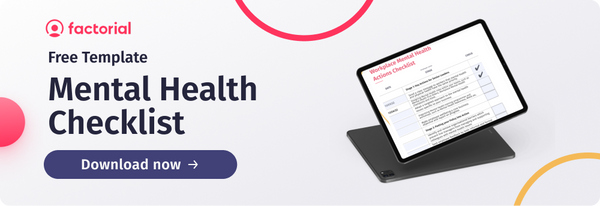A duvet day is a type of leave that allows employees to take a day off work without providing notice or a specific reason. It is often considered a form of self-care and is meant to help employees manage stress and anxiety.
Having duvet days can prevent burnout by giving your employees time to think and recharge their batteries. It’s also a fundamental pillar in any mental health policy that fosters transparency. It’s how you open the doors for your employees to take some time off with independence and responsibility, avoiding uncomfortable situations where people need to lie to skip work for a day.
- What is a Duvet Day?
- Why Do People Take Duvet Days?
- Why Should You Implement Duvet Days in Your Organisation?
- How to Know if Your Team Needs Duvet Days
- Automating Leave Management with Factorial
What is a Duvet Day?
A duvet day is a type of unscheduled leave that an employee can take when they don’t feel like working. It’s essentially a day off to sleep, recover and take care of personal well-being. Having duvet days allow employees to unwind and be free of responsibilities for a day.
But how does this differ from other absences such as sick leave or holidays?
Unlike other types of absences, team members don’t need to provide a reason for taking a duvet day, other than to say they’re using their entitlement.
The idea is to promote a healthy company culture by showing understanding and compassion towards employees and recognising they are human beings rather than cogs in a machine. If you are working towards an employee-centric culture at the office, then incorporating duvet days into your contracts is a must. It helps new hires understand the rules from the start, and foster an honest and open workplace within which people don’t have to lie to get a day off.
The UK government recognises the importance of mental health in the workplace and encourages employers to implement mental health policies that support the well-being of their team. But still, duvet days are not mandatory and you won’t get penalised if you don’t have them.
Why Do People Take Duvet Days?
According to a survey by Time 4 Sleep, 61% of UK adults admitted to taking a duvet day to recover from their work schedule. The top three most common reasons for taking a duvet day were tiredness, anxiety and stress.
In addition, the same survey revealed 65% of UK workers would prefer to take a job in a company that offers duvet days as part of their employee well-being plan. That’s a landslide victory for duvet days…
Building them into your mental health policy is beneficial for the overall well-being of employees and your long-term talent retention strategy.
Why Should You Implement Duvet Days in Your Organisation?
Duvet days are not just a way to relax and take a break from work. They also have tangible benefits for both employees and the organisation. Here are a few reasons why your company should consider implementing duvet days as part of your mental health policies:
Improves employees mental health
Stress at work is a major concern for any organisation. Not only is it one of the main causes of underperformance, it also leads to employee burnout and potentially unrecoverable health consequences.
Duvet days provide a way for employees to take a break and relax without the need to call in sick when they’re not.
By offering duvet days as a formal benefit within your mental health policy, you can reduce the stigma surrounding mental health and encourage employees to be honest about their needs. This can foster a culture of openness and trust, leading to better communication and collaboration in the office and higher talent retention rates.
Increases employee performance
Duvet days allow employees to recharge and decompress which can increase their productivity and motivation when they return to work.
It’s no secret that paid time off is appreciated by workers in all industries. Many well-known companies are now introducing creative time off regulations in the hopes of improving performance. For example, Microsoft has implemented a Discretionary Time Off policy allowing employees to take holiday without recording it and essentially take unlimited annual leave. This is rooted in the theory that employees with more agency over how and when they work feel trusted and perform better.
Attracts Top-Tier Talent
Organisations offering progressive benefits such as duvet days, unlimited holiday time and flexible working hours are more likely to attract in-demand talent. These employee benefits can help stand out from the competition and encourage new hires to stay.
Now more than ever, young workers are looking for employment opportunities that offer an even work-life balance. In fact, a survey by CNBC found that the top reasons millennials chose to work for their current organisation were strong work-life balance and learning and development opportunities.
Promotes a positive company culture
Duvet days send a message to employees that the company values their well-being and trusts them to use the time off responsibly. Displaying these qualities helps to define who you are as an organisation and create a more positive work culture where your people feel valued and secure.
Research by Deloitte and Glassdoor has found that 77% of UK adults say their work culture is one of the main reasons for staying in their job.
Building a supportive company culture has commercial benefits, too. The same survey revealed that 88% of employees believe distinct company culture is important to business success.
Reduce unplanned absences
Unplanned absences can be a major problem for any organisation. They can break the workflow and affect the overall performance of your team.
According to Health and Safety Executive research, work-related stress, depression or anxiety accounts for an estimated 17 million lost working days each year in the UK. Duvet days can help reduce these absences as they minimise the risk of employees reaching breaking point and requiring further sick days.
How to Know if Your Team Needs Duvet Days
Implementing duvet days can be a great way to improve employee well-being. But it’s also important to ensure that it’s the right fit for your team.
Here are a few signs that your team may need duvet days:
1. High Levels of Stress and Burnout
If you notice that your employees are frequently stressed, anxious or burnt out, it may be a sign that they need more time to rest and recover. Duvet days can provide them with the opportunity to take a break from work-related stress and come back to the office renewed.
You can also track the number of absences related to health, such as sick days. This way, you can see if there is a trend of employees taking time off for mental health reasons. If you see an increasing trend, it can be an indication that your team needs more support.
Conducting employee surveys to gather feedback on how your team is feeling at work can massively help to detect any potential issues and to understand what they need to improve their work-life balance.
2. Unplanned Absences
Unplanned absences can be disruptive to productivity and workflow, and can make it difficult for managers to plan and schedule work. If you’re noticing a trend of absences, it may be a sign that your employees are feeling overwhelmed and need a way to take a break.
3. Decreased Productivity
According to a study by the American Psychological Association, employees who reported high levels of stress were more likely to have lower productivity levels. By providing your team with the opportunity to take a duvet day, you can help them recover at home and improve their productivity levels. This will not only benefit your employees but your organisation as a whole.
4. High Turnover Rates
It’s important to monitor and avoid high turnover rates as they can be costly in terms of recruitment, training and productivity. Implementing duvet days as part of a comprehensive employee benefits package can help improve job satisfaction and reduce turnover rates.
How to Automate Leave Management With Factorial
From tracking holiday days to duvet days, it can be difficult to stay updated with all the different absences to monitor. And even harder to ensure that your team is able to fully recover from time off and return to work motivated. That’s why using an HRIS is the most effective way to manage absences.
Factorial is a powerful tool that offers a comprehensive solution for managing employee absences:
- Track time and reduce absenteeism: You can now add an hourly time tracker when providing your employees with holiday and other types of absence availability. This allows you to gain more visibility into how your employees are using their time off.
- Manage your employees’ time off and assign shifts: Choose the type of time tracker you want for each type of holiday and absence policy. You can also set the maximum number of hours for each type of absence, giving you more control over how your employees use their time off.
- View past and future hours of absence: With our HRIS, you can easily view past and future hours of absence taken by your employees. This allows you to stay on top of who is taking time off and when, so you can plan accordingly.
- Create and schedule recurring cycles for holiday hours: An absence and holiday cycle is a period of time in which the days or hours of holidays corresponding to each worker are counted. With Factorial, you can easily determine the dates of the cycle so that it repeats itself and drag unused holiday hours from cycle to cycle.
👉 Try Factorial for free for 14 days.



